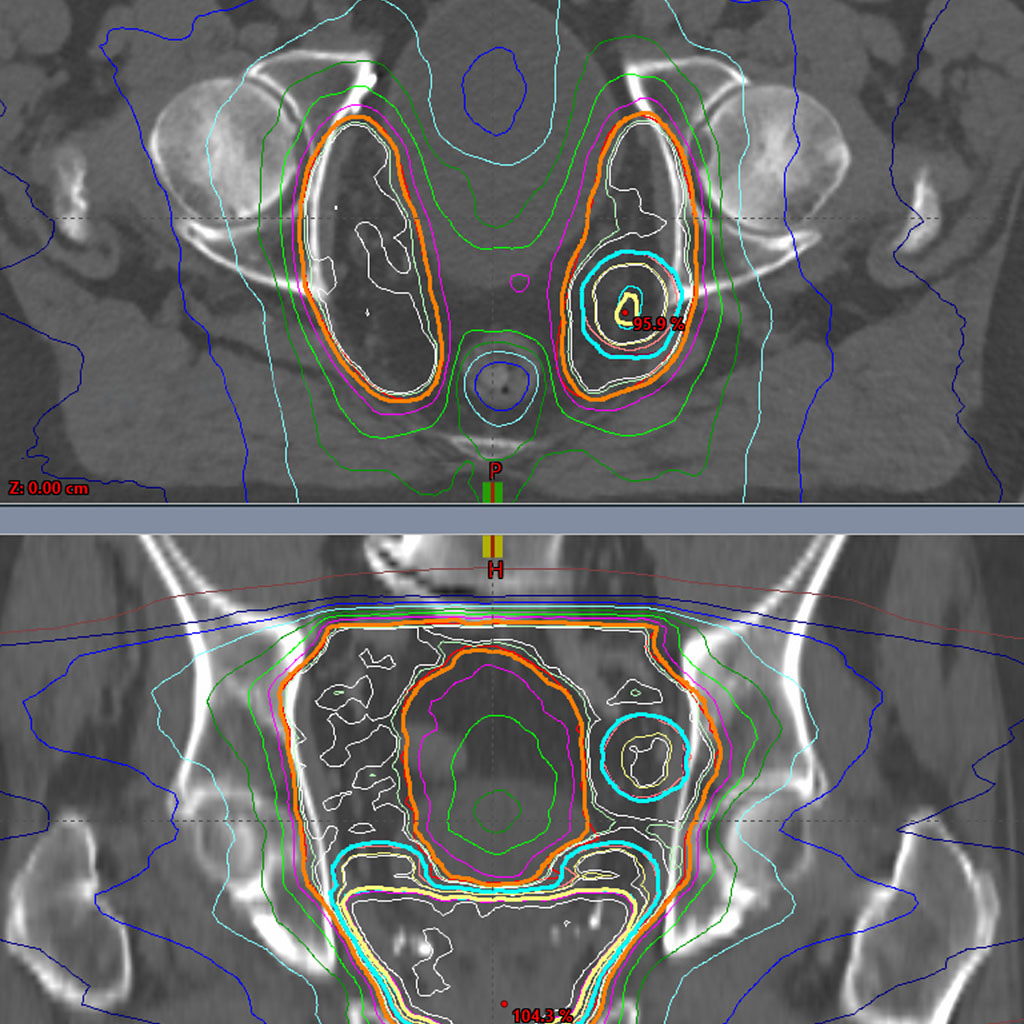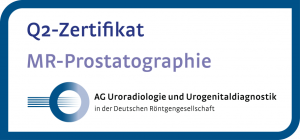We offer this service at the following locations:
Prostate cancer is the most common cancer in men. According to the German Cancer Aid organisation, around 70,100 men are diagnosed with the disease every year. Age is one of the main risk factors. The older a man is, the higher his theoretical risk of developing prostate cancer. The earlier the tumour is detected, the greater the chances of recovery, which is why screening is so important. At the Radiological Centre Munich, we offer you a special examination for this purpose: Multi-parametric MRI (mpMRI) of the prostate combines various techniques to produce several images simultaneously.


Your specialists
Prof. Dr. med. Jürgen Scheidler
PD Dr. med. Daniel Theisen
Multiparametric MRI (mpMRI) for prostate screening in Munich
What is special about multiparametric MRI (mpMRI) of the prostate?
Multi-parametric MRI is a combination of several different techniques for diagnosis and prostate screening that utilise different parameters:
- Morphology: high-resolution imaging of the tissue structure using so-called T2-weighted images in 3 planes using thin-slice technology to localise suspected tumour foci
- Diffusion: visualisation of the mobility of free water in the intercellular space. Tumours have a reduced diffusion capacity as a distinguishing feature from benign tumour changes
- Perfusion: visualisation of blood flow using contrast medium. Tumours are often more heavily perfused than benign changes
- Metabolism: MR spectroscopic (MRS) measurement of the choline and citrate content
The experience
- Since 1995, MRI of the prostate has been performed for preventive purposes at our centre in Munich, since 2003 using multi-parametric technology
- More than 1,000 examinations/year at our radiology centre for years
The quality
- Prompt appointments
- Latest 3 Tesla MRI technology
- “4-eyes principle”, co-diagnosis by certified experts, personal discussion of findings, standardised diagnosis according to PI-RADS
- Images on CD fusion biopsy-certified, PI-RADS findings and biopsy scheme
The experts
- Prof. Dr. Jürgen Scheidler: Expertise since 1996 in research and clinical practice with prostate MRI, habilitation on prostate MR spectroscopy, numerous publications on the subject, member of the guideline commission, DRG reviewer and certified to the highest certification level (Q2)
- PD Dr. Daniel Theisen: Many years of expertise in abdominal and prostate MRI in clinical practice and research, numerous publications, certified to the highest certification level (Q2)
- Pacemakers/event recorders/stimulation devices etc.: Only some of these devices are suitable for MRI to a limited extent. In individual cases, the implant passport that you send us in advance must be used to check whether and under what conditions an examination is safe for you.
- Artificial hip joints/knee joints/spinal implants: no risk for you as a patient. In rare cases, hip TEPs can cause image disturbances, which in individual cases can make the examination unusable, but this cannot be predicted and must be tried out.
Private health insurance companies generally cover the costs of the examination in full.
So far, we can only offer the examination to patients with statutory health insurance as an IGEL service, as mpMRI is not yet included in the catalogue of services. Our aim is to be able to offer the examination to all patients at reasonable prices, regardless of their insurance status. Patients with statutory health insurance can request a cost estimate in advance when making an appointment.
According to the current S3 guideline, it is recommended in the following cases:
- in the case of PSA elevation/increase, if no tumour-suspicious nodules are palpable in the urological examination or visible in the ultrasound. If no suspicious areas are found in the mpMRI, a biopsy can be dispensed with. On the other hand, tumour-suspicious nodules can be reliably clarified by targeted sampling with an MRI-ultrasound fusion biopsy.
- as part of active surveillance, if a small prostate tumour has already been confirmed in you, but this shows a slow growth tendency (low Gleason score), so that treatment is initially postponed until the tumour shows a growth tendency
- to diagnose the extent of the tumour before surgical, radiotherapeutic or drug treatment
Numerous studies have now demonstrated the superiority of mpMRI over the standard procedure of PSA determination, clinical examination and untargeted biopsy. The accuracy of mpMRI is around 85%. In a large study published in the New England Journal of Medicine (PRECISION), more than 25% of biopsies (i.e. in more than every 4th man!) could be omitted with the use of mpMRI, and 12% more aggressive fast-growing prostate tumours were diagnosed by the combination of mpMRI and targeted biopsy, which would otherwise not have been detected (http://www.nejm.org/doi/full/10.1056/NEJMoa1801993).
It is recommended to perform the examination on a 3 Tesla MRI without a probe in the rectum (without endorectal coil). It must at least
- morphological imaging with a slice thickness of 3mm and a resolution of <0.5mm and
- diffusion-weighted imaging with a slice thickness of 3mm
- Contrast agent perfusion is also recommended and is mandatory for inconclusive findings (PI-RADS 3)
The examinations are always carried out in accordance with the guidelines.
It is best to have the examination in the morning. You should only eat a small breakfast and, if possible, have emptied your bowel and bladder beforehand. No further measures are necessary.

